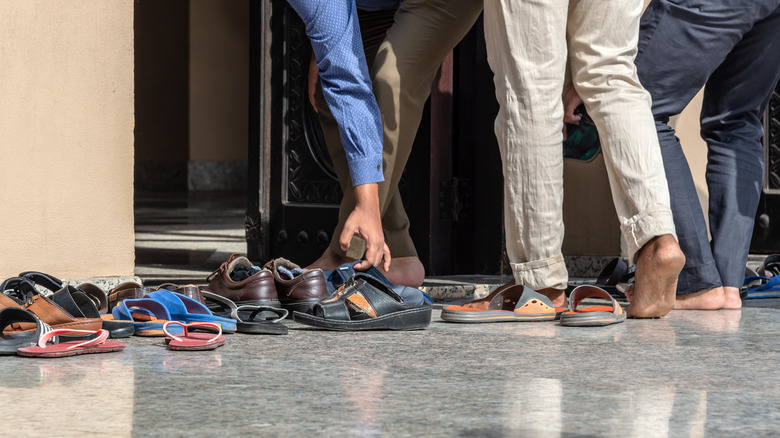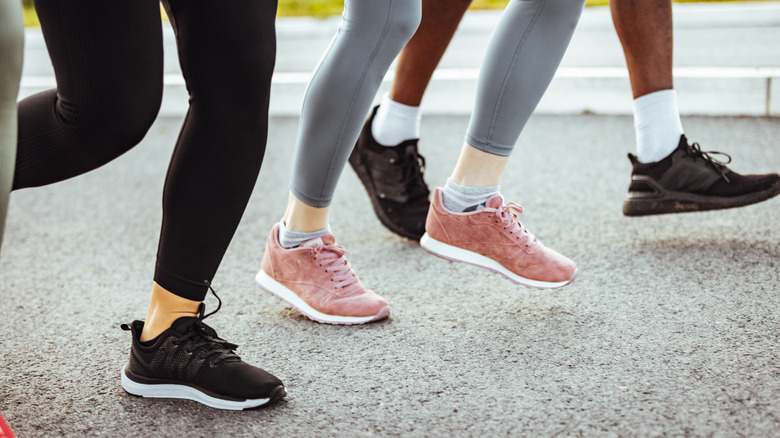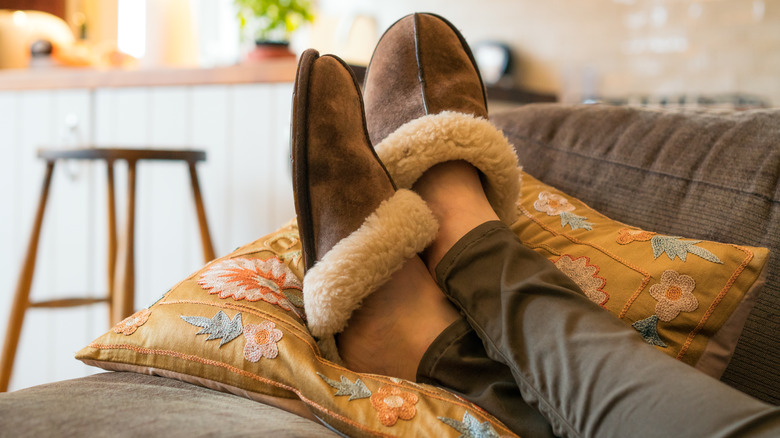Wearing Shoes In The Home? Here's What An Expert Has To Say
One etiquette topic that's sure to spark a heated debate is the issue of wearing shoes in the house. We've all seen movies where people hop on their beds wearing shoes from outside and some of us gasp and recoil in aghast. While it may seem mild and trivial to some people, to others, it's one of the biggest icks and a huge no-no. In several cultures, especially in Asia, it is customary to remove one's shoes at the door when you step into the house. It's seen as a sign of respect for the homeowner (and a benefit for your own hygiene).
In our society, however, it's not uncommon to see people gallivanting in their homes wearing their "outside shoes" without a second thought. In the quest to determine which side is actually in the right, it helps to hear from an expert. Find out if wearing shoes in the house is truly no big deal or if there's something foul about it.
Shoes bring home a lot of outside germs
After a long day outside, it feels great to be able to kick those shoes off and let your toes breathe. However, some of us prefer to keep our shoes on when we get home just to walk around the house. Which way is the right way to go?
Environmental microbiologist at the University of Arizona Kelly Reynolds confirmed to Real Simple that shoes pick up a host of bacteria and germs from the grounds and floors they come in contact with. "Shoes are a common vehicle for bringing major contaminants into the home," Dr. Reynolds explained. The University of Arizona found that disease-causing bacteria such as E. Coli and Klebsiella pneumonia get picked up on our shoes and transferred to our homes when we don't take them off.
These pathogens can harm you if they get in contact with your body's entry points including your mouth, eyes, or nose. If you think you're exempt from the possibility, think again. "Think about the cycle of transmission," she stated. "Do you have kids crawling around, or do you sit on the floor yourself?" Even your dog could pick up these germs from eating off the floor and then licking you. The worse part? These pathogens typically have long lifespans. "In general," Dr. Reynolds informed, "we know bacteria can survive for days to weeks, and viruses for weeks to months."
Avoid germs by taking your shoes off in the house and using home shoes instead
All things considered, the verdict is in favor of the no-shoes-in-the-house policy. If you like stomping all around your house with your outside shoes on, it might be time to officially end the habit. If you feel more comfortable wearing things on your feet inside your home, opt for house slippers as an alternative to your outdoor shoes. The slippers should be strictly confined to the home to prevent contact with bacteria from outside. This way, you get the sensation of shoes on your feet and the relief of knowing you don't have to sacrifice your hygiene for it.
Health is wealth after all, and you should consider the safety of yourself — as well as anyone else who may be living with you. A heavy emphasis should be placed on cleaning and disinfecting your floors and surfaces, especially if you have kids or pets. According to Healthline, this means wiping down surfaces with bleach. Make sure predominantly wet tools like sponges are properly washed and kept in dry places, and regularly mop with disinfectant.


